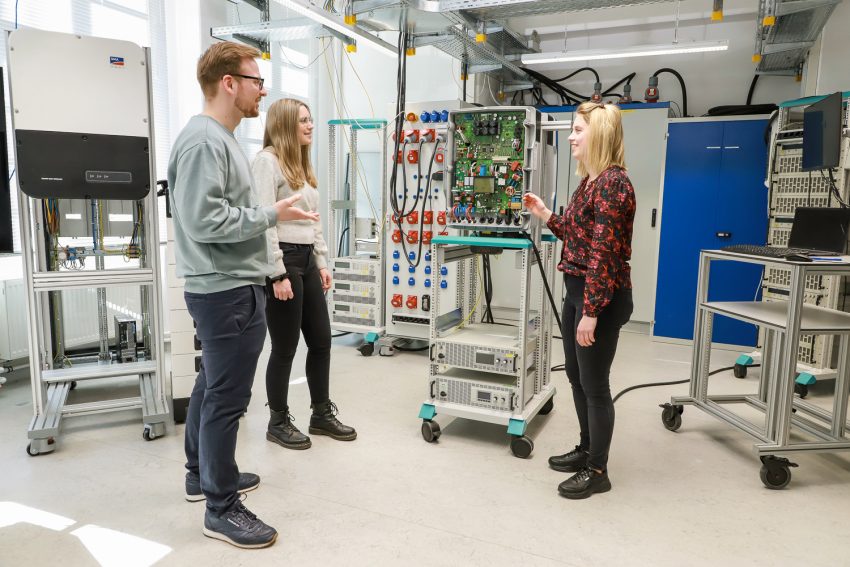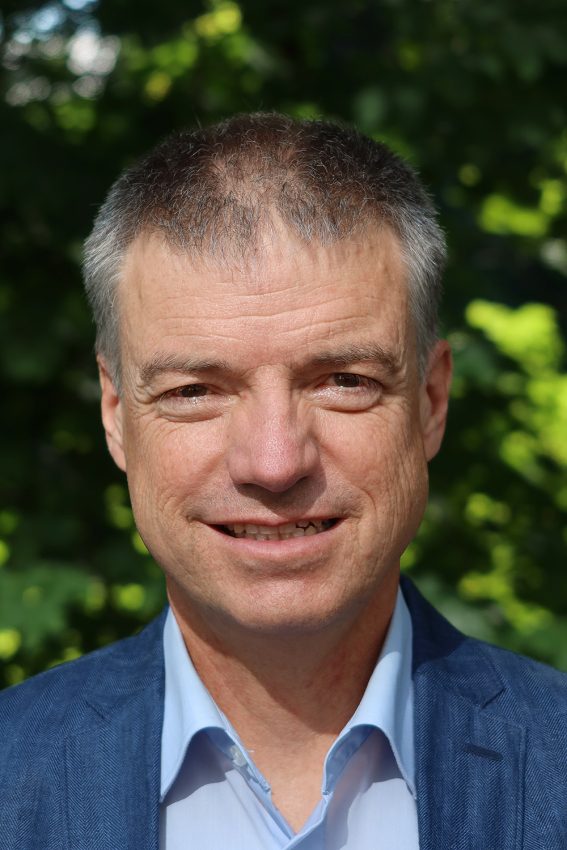Studying sustainability: New technologies and more impact assessment New Bachelor's programme follows desire for more climate and environmental protection topics in the curriculum
In the winter semester 2022/23, the new degree programme “Sustainable Power Systems and Electromobility”, or NEEMO (Nachhaltige Energiesysteme und Elektromobilität) for short, will start at the Faculty of Electrical Engineering, Information Technology, Physics at TU Braunschweig. The focus is particularly on the energy transition – away from fossil fuels to sustainable power generation. Graduates should not only create the technological basis for this, but also the acceptance for new technologies. Professor Bernd Engel, head of the elenia Institute for High Voltage Technology and Power Systems, explains in an interview with Mark Winter how students will be prepared for this task.

Students in the new NEEMO degree programme learn about the technical foundations of the energy transition. Photo credits: Kristina Rottig/TU Braunschweig
Professor Engel, what is a sustainable energy system? What distinguishes it from non-sustainable systems?
For a start, a sustainable energy system is ecological, social and in line with the UN’s 17 Sustainable Development Goals. Above all, this means that the energy system is climate-neutral. Energy is supposed to be generated on the basis of renewable energies. That would be mainly photovoltaics, wind power, but also biogas. And of course we need a fallback level for the so-called dark period, which can last two to three weeks in winter, which can then consist of hydrogen combustion in gas-fired power plants, for example.
What are social aspects in the context of energy systems?
First of all, this includes affordability, but citizen participation is also a significant part. This means, for example, that energy communities are formed with strong participation of local people who are allowed to generate, store and sell electricity themselves according to EU guidelines.
What significance will sustainable energy systems have in the future city?
In the future city, there will be neighbourhood solutions in which citizens are much more involved with the production and consumption of energy. This will enable them to make the neighbourhood climate-neutral themselves. Here, they can determine the energy, climate and transport transition locally themselves. In the research focus “Future City”, for example, we are conducting research together with the Institute for Building Climatology and Energy of Architecture (IBEA) on the storage of self-generated energy in clay walls.
So graduates of the NEEMO programme should also help shape the future city?
That’s what I would like to see.

Professor Bernd Engel is the head of the elenia Institute for High Voltage Technology and Power Systems. Photo credits: Bernd Engel/TU Braunschweig
How are students prepared for this role in the degree programme? What do they learn in concrete terms?
In addition to engineering and natural science subjects, we also focus on sustainability in our new NEEMO degree programme. Furthermore, the interdisciplinary discussion of technology consequences is practised there. Here, for example, the advantages and disadvantages of battery-electric vehicles are weighed up against hydrogen vehicles. Which technology has the greater impact on the environment? Which is more economical? In this way, the students are introduced to a multi-criteria evaluation of the technologies. We want to put them in a position to discuss this with the public as well.
What was the reason for setting up the degree programme?
There were two main reasons. The first was that we noticed that many school graduates would like to focus their studies on renewable energies and electromobility and would like to deal with the topic on their own initiative. And the second reason is that the topics of batteries, hydrogen and renewable energies also need a broader basis in their studies. And we want to teach these basics in a Bachelor’s programme. In addition, many well-trained engineers are needed on the labour market for the goal of climate neutrality in 2045.
So engineers are taking on the leading role here?
We do not just need the technical foundations that graduates can create. We also need political acceptance for such technologies. This is particularly important at the moment. The keyword is “freedom energies” – renewable energies that free Germany from energy policy dependencies. Here we have to see how things develop. Acceptance, also among the population, fluctuates very often. Onshore wind turbines, for example, do not always meet with undivided approval, especially if you can see the wind turbine from your garden. But we need renewable energies and also a certain amount of grid expansion so that the energy can be transported to the consumers. I hope that the acceptance of this will stabilise at a high level.
How important is sustainability in other engineering professions?
The importance of sustainability will grow here as well. That is quite certain. And there are, of course, other degree programmes at our university, for example Sustainable Engineering of Products and Processes in Mechanical Engineering, which already deal with the topic. But we believe that we can only achieve climate neutrality if we electrify many processes. This means that, in essence, a solid electrical engineering education is necessary for the energy, mobility and climate turnaround. We have created a suitable degree programme for this at the Faculty of Electrical Engineering, Information Technology, Physics.
The programme is advertised with the slogan “engineer of the future”? In your opinion, what does the engineer of the future look like?
The engineer of the future has a solid grounding in electrical engineering and the natural sciences, such as electrochemistry or thermodynamics. In addition, graduates have important expertise in energy systems and electromobility. They can communicate and discuss research and technology with different stakeholders and create acceptance there. They can develop sustainable products and operate the energy networks of the future. This gives them a wide range of possible applications in the professional world. The Bachelor’s programme can lay the foundations for this and we hope that graduates will then specialise further in the Master’s programmes, for example in electrical engineering (with the elective area “energy systems and drive technology”), electromobility or sustainable energy technology.
Thank you for the interview.
